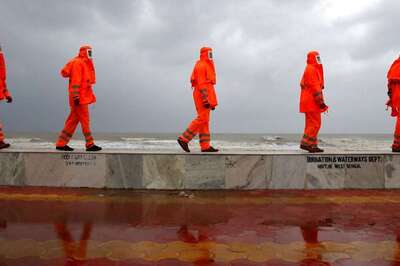
views
The world has not become suddenly messy, as is suggested by the editorial piece in the Hindustan Times (30 April) on “The myth and reality of the SCO grouping”. The collapse of the Soviet Union in 1991, its impact on India which lost its biggest political, military and economic partner, India’s 1991 economic crisis, the onslaught of Pakistan-promoted terrorism against India from 1990 onwards leading to the 2008 terrorist mayhem in Mumbai, the earlier 2001 terrorist attacks on the US by Al Qaeda, the US invasion of Afghanistan, later of Iraq as part of US regime change policies were all messy.
So were the consequences of NATO’s relentless eastward expansion ignoring Russia’s protests, the break-up of Yugoslavia in 1991-92 and NATO’s attacks on Serbia in 1999. India’s 1998 nuclear tests were seen as a very “messy” blow to the NPT and exposed us to western sanctions. The Arab Spring from 2010 onwards, the regime change in Libya in 2011 and an attempted one in Syria, the Iranian nuclear issue, sanctions on Iran which forced India to stop importing oil from its second largest supplier, created an international mess too.
Regime change in Ukraine leading inexorably to the current Russia-Ukraine conflict, China’s expansionism in the western Pacific, its penetration in our neighbourhood, its violation of all existing border agreements with India, the massing of its troops on our border, the clash in Ladakh, Western sanctions on Russia following its military intervention in Ukraine and their impact worldwide, the US declaring both Russia and China as its adversaries have all added to the global “mess” over the years.
To argue that the international order has become messy only now implies that it was not messy earlier, or less messy, which is not true. In fact, the assumption that there was an “international order” all this while which has got disturbed today is misconceived, as is apparent from the varieties of “disorder” that have affected the international landscape in recent times as outlined above, and indeed, historically.
To argue that the so-called “messiness” in world affairs today was on display at the recent SCO meeting of Defence Ministers is a political exaggeration. If the West uses platforms like NATO, the EU, the G7 and the G20 to attack Russia, it is not surprising that Defence Minister Shoigu would use the SCO meeting to attack the West, express concern that the West was seeking to contain China and characterise the QUAD and AUKUS as evidence of the US creating blocs. Shoigu said nothing that has not been said earlier many times by Russia at President Putin’s level and that of Foreign Minister Lavrov.
On the QUAD we have publicly disagreed with Russia. Why we should take exception to what Shoigu has said when the US and some European countries have publicly expressed their unhappiness with our unwillingness to condemn Russia for invading Ukraine, of berating us that we are on the “wrong side of history” and pressuring us to reduce our defence ties with Russia. We have been criticised for buying discounted Russian oil. We have not yielded to this pressure and have pursued our national interest. Russia’s position on the QUAD, with which we do not agree, is directed at the US and India is not singled out explicitly for criticism as a partner in the US strategy, nor is India being asked to reduce its ties with the US and Europe. The West, on the other hand, targets us explicitly on our position on the Ukraine conflict and demands that we dilute our ties with Russia.
Is our relationship with Russia only transactional guided by our defence and oil needs as the HT editorial would argue? According to it, “serious policymakers” in India are aware that Russia invaded Ukraine and Putin crossed a line in February 2022. Whatever the rights and wrongs involved in the Ukraine conflict, is it the case that our “serious policymakers” are ignorant about all that led to it, including NATO expansion, the overthrow of the legitimately elected Ukrainian president in 2014 and the failure to implement the Minsk agreements for 7 years? If we have overlooked all the excesses of US and European policies in West Asia, the handing over of Afghanistan to the Taliban, the decision to approve $450 million military aid to Pakistan to upgrade F16s in September 2022, etc, and are building up very strong ties with the US and Europe in our national interest — and rightly so — why do we want to be so judgmental on Russia’s actions in Ukraine.
If India’s interests have been hurt by the Ukraine conflict, India is neither alone in this regard nor has been hurt more than others, indeed we have been hurt less than many countries. Fuel, food and fertiliser shortages have hurt the poorer African countries the most. Europe has by choice chosen to suffer by breaking energy and other links with Russia, with serious consequences for the German economy in particular. If inflationary trends in the West have become a cause of concern, forcing interest rates to rise, and fears of recession are stalking both the US and European economies, it needs to be analysed how much this is due to the West’s determination to isolate Russia economically, defeat Russia militarily and oust Putin from power. Western sanctions have disturbed global trade and payment systems- indeed India is suffering more on this account.
To argue that because of the Ukraine conflict, the US has finally woken up to the threat posed by China is wrong, as the US had identified China as its principal threat much before Russia’s intervention in Ukraine. China’s expansionism in the South China and East China Seas and President Xi Jinping’s openly declared ambitions and time lines to challenge US primacy triggered this. Already, during Trump’s presidency the recognition of the China threat had come to the fore. The then Vice-President Pence spelt out dramatically “the whole of government” China’s threat to the US in a speech in 2018.
That at the SCO meeting the Chinese Defence Minister was underplaying his country’s hostile policies against India and pretending that issues between the two countries were under control is a reiteration of the line China has been taking in recent months. This is an answer to our Foreign Minister’s repeated statements that relations between the two countries are abnormal and cannot become normal unless the situation on the border becomes normal. We have had 18 rounds of discussions at the military/diplomatic level and obviously know the Chinese position. China is on a “peace mission” worldwide and wants to draw attention away from its aggression in the Himalayas.
Pakistan’s claim to be a “peace loving” country is a posture that will not convince the generality of SCO members. India has been focusing on the terrorism issue in the SCO and BRICS and other forums. Concerns about terrorism are shared by SCO members as reflected in the Regional Anti-Terrorist Structure of the SCO. There is no international agreement yet even in the UN on how to define terrorism, and therefore to expect the SCO forum to share our concerns beyond a point would be unrealistic. China shields Pakistan on terrorism directed at India but pressures it on its own Uighur related terrorism concerns. The US remains ambiguous on Pakistan’s terrorist affiliations as reflected in its decision to reach out to Pakistan to facilitate its handing over of Afghanistan to the Taliban. The SCO gives us a platform to put Pakistan indirectly on the mat and keep regional pressure on it, as the Central Asian states are also concerned about the Pakistan-Afghanistan Islamist axis.
To argue that India’s real diplomatic focus is on the QUAD, the engagement with the US and the G20, and that these are far more useful exercises than SCO meetings is to lose sight of the fact that India as an Asian country cannot opt out of an Asian/Eurasian organisation which now has Iran as a full member, three countries as observers — Afghanistan, Belarus and Mongolia — and nine as dialogue partners — Egypt, Saudi Arabia, Turkey, Nepal, Sri Lanka, Cambodia, Azerbaijan, Armenia and Qatar. Should we neglect our broader neighbourhood? India’s rising stature and ambitions require that we maintain as broad a diplomatic footprint internationally as possible. Our taking up the leadership of the Global South should also in that case be considered a needless distraction from our QUAD and US ties as well as those with the G20 countries.
Asking India to separate rhetoric from substance to understand the “messiness” represented by the recent SCO meeting is not an objective evaluation of India’s overall national interest.
Kanwal Sibal is a former Indian Foreign Secretary. He was India’s Ambassador to Turkey, Egypt, France and Russia. The views expressed in this article are those of the author and do not represent the stand of this publication.
Read all the Latest Opinions here




















Comments
0 comment